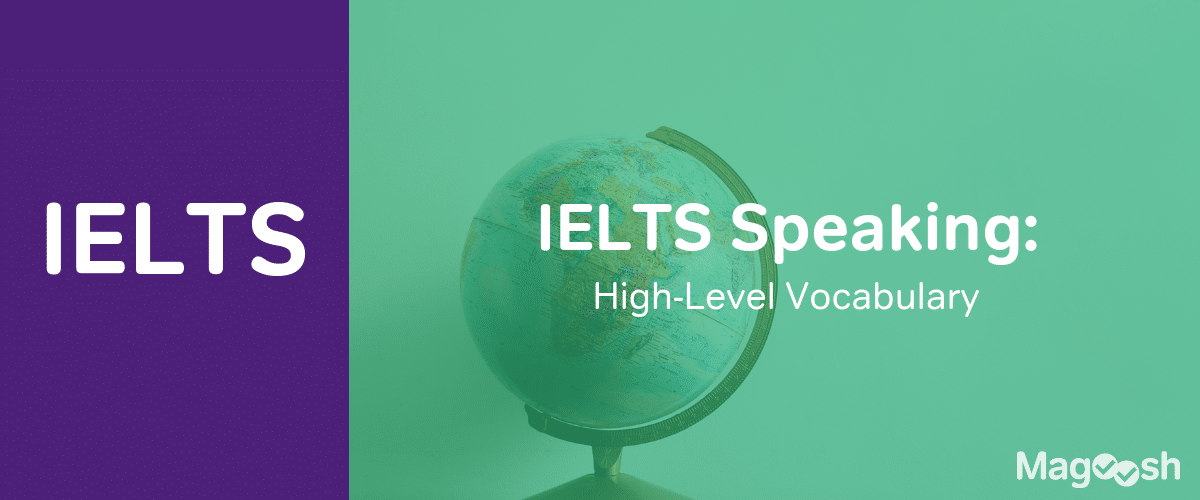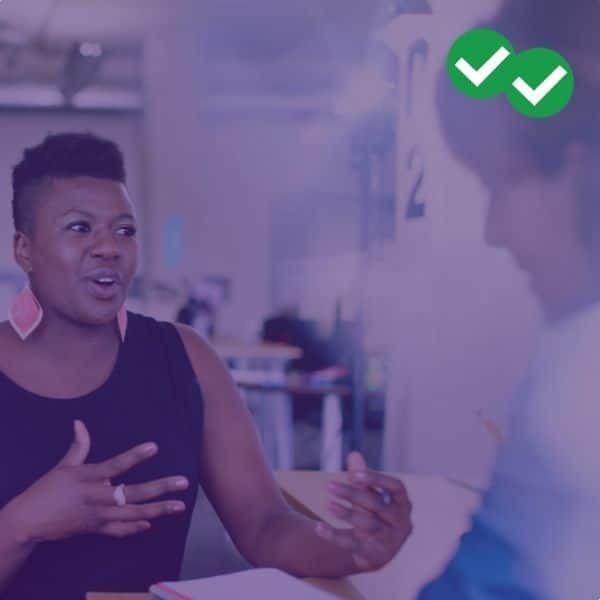
Your IELTS speaking score is based upon four separately assessed skills. This article will be helpful to you if you’re concerned about the 25% that depends on your lexical resource, or vocabulary. If you haven’t yet, familiarize yourself with what to expect when it comes to IELTS vocabulary. Then, keep reading here to learn what it means to use high-level words on the IELTS Speaking section.
What counts as high-level words on the IELTS speaking section?
To answer this question, let’s start by taking a look at the characteristics of a speaker that would receive one of the highest band scores (7 – 9):
- uses a wide range of vocabulary readily and flexibly to convey precise meaning to discuss a variety of topics
- uses less common and idiomatic vocabulary skillfully with accuracy (or only occasional inaccuracies)
- shows some awareness of style and collocation, with some inappropriate choices
- uses paraphrase effectively (as required)
On the other hand, a speaker who would receive one of the lower band scores (2 – 4) probably:
- is able to talk about familiar topics, but can only convey basic meaning on unfamiliar topics and makes frequent errors in word choice
- rarely attempts paraphrase
- uses simple vocabulary to convey personal information
- has insufficient vocabulary for less familiar topics
- only produces isolated or memorized utterances.
Based on the information above, taken from the IELTS rubric, a high-level score is clearly connected to range. This doesn’t mean that you know a lot of big words but that you can use a rich vocabulary to express one thing in many ways. Notice the reference to paraphrasing. This is one way that an examiner can tell that your vocabulary is beyond basic.
For a better understanding of paraphrasing, check out our YouTube video on paraphrasing.
So, how do I demonstrate a high level of vocabulary with respect to range?
Well, let’s talk more about paraphrasing. Imagine that the interviewer says,
Technological advances like the internet have changed the way that people learn, work, and communicate with one another. How do you think this might this change the future of education?
If the simple version of your answer is that more learning will be available online, you can begin your response in a number of ways. Imagine staring with:
(1) I think this will change the future of education by making more available online.
Notice how this response begins with a word-for-word repetition of the question. Responding to a question by referring to it is a strong way to start, but repetition doesn’t show that your vocabulary is wide-ranged and flexible. Consider the next example:
(2) Because of technology, I think more people will be able to get their education online in the future.
This response, like answer (1), refers to the question, but it’s slightly more unique in it’s wording. Instead of a verbatim repetition, it shows that you can discuss the same ideas in different words. Let’s look at one last example:
(3): How technology will shape education is difficult to guess, but I could imagine that more people will be able to access programs that let them learn and take courses online.
Just like answer (2), you’re essentially expressing the same idea in a different way. But this time, you’re also stepping away from the basic way of referring to someone’s opinion. Instead of introducing your opinion as “I think…” in response to “How do you think…” you’re referring to opinions and ideas in other ways: “difficult to guess” and “I could imagine…”. Furthermore, instead of just repeating the word education, answer (3) uses different words to explore the same thing—education, programs, learn, courses—just as the verb shape provides a new way to talk about how education will change.
Again, using high-level words for IELTS speaking exam doesn’t automatically mean a higher score. It’s about flexibility and your ability to adapt them for use in everyday speech. It’s undeniable, of course, that having a larger vocabulary is just as much an integral part of lexical resource. For ideas about how to integrate more words into your vocabulary for the IELTS speaking test, check out this series of IELTS Speaking and Vocabulary resources, along with our vocabulary lesson video:





